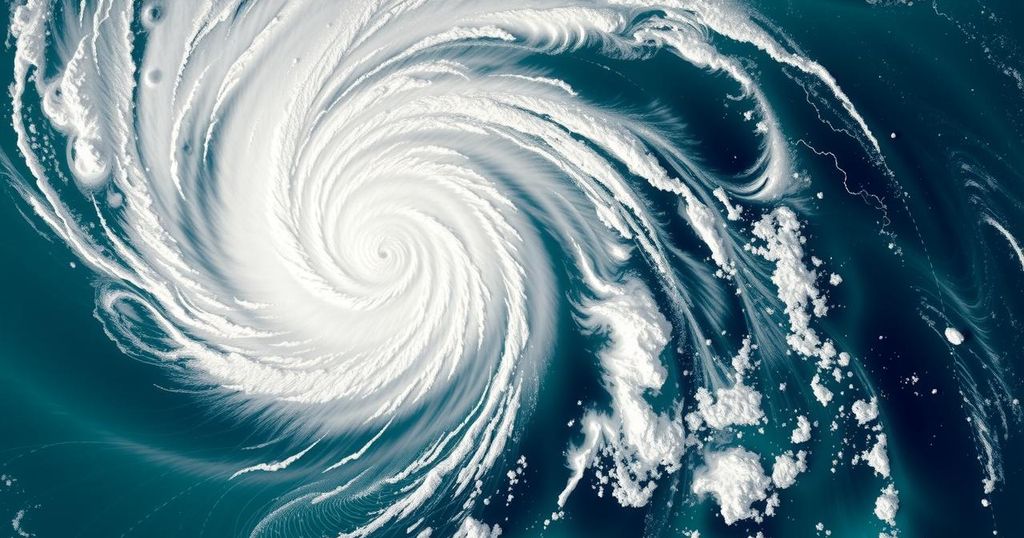Climate change
Global news
AFRICA, CHI, CHIDO, CLIMATE, CLIMATE CHANGE, EMMANUEL MACRON, MALAWI, MAYOTTE, MÉTÉO - FRANCE, METEO - FRANCE, MÉTÉO - FRANCE LA RÉUNION, MOZAMBIQUE, NATURAL DISASTER, NATURAL DISASTERS, POWER OUTAGES, REGIONAL SPECIALIZED METEOROLOGICAL CENTRE, REUNION, WMO
Jamal Walker
0 Comments
Tropical Cyclone Chido Hits Mayotte: A Historic Meteorological Event
Tropical Cyclone Chido struck Mayotte on December 14, 2023, with record wind speeds and significant rainfall, leading to severe destruction. Despite timely warnings from Météo-France, the cyclone resulted in a national day of mourning by French President Emmanuel Macron. The cyclone’s unusual path and intense effects have raised discussions on the implications of climate change and hurricane preparedness in vulnerable regions.
On December 14, 2023, Tropical Cyclone Chido struck Mayotte, achieving wind speeds exceeding 200 km/h, with gusts reaching over 225 km/h. This storm is noted as the most powerful to hit the region in nearly nine decades, according to Météo-France. Alongside the fierce winds, Mayotte experienced torrential downpours of 176 mm within a mere 12 hours, coupled with perilous sea conditions featuring waves averaging over five meters in height. The cyclone’s exceptional intensity even devastated some of Météo-France’s observation facilities.
In response to the catastrophe, French President Emmanuel Macron proclaimed a national day of mourning, while emergency measures were swiftly activated amid initial reports suggesting that hundreds of lives might have been lost. Mayotte, with its fragile housing infrastructure, was unprepared for such a severe tropical cyclone. Despite Météo-France issuing timely warnings—beginning with an amber alert on December 13 and escalating to a violet alert—the destruction was catastrophic.
Chido’s trajectory was unusual as the storm bypassed Madagascar, which could have lessened its impact. Upon making landfall, Chido fully enveloped the small island of Mayotte. Following this incident, the cyclone proceeded to strike Mozambique on December 15, causing further heavy rainfall across Mozambique and Malawi. In terms of climate change implications, Météo-France remarked, “Our current state of knowledge doesn’t allow us to draw any conclusions about the role of climate change on the track of the cyclone and on its intensity.”
Additionally, Météo-France La Réunion serves as a Regional Specialized Meteorological Centre, focusing on tropical cyclones in the Southwest Indian Ocean. The seasonal forecast from October indicated an enhanced probability of earlier cyclonic activity, predicting between nine to thirteen systems for the 2024-2025 season, with four to seven expected to reach tropical cyclone strength.
The occurrence of Tropical Cyclone Chido in December 2023 marks a significant meteorological event for Mayotte, a small island in the Indian Ocean. Historically, the region had not experienced such a powerful storm in at least 90 years, underlining the severity of Chido’s impact. Météo-France plays a critical role in weather predictions and warnings, having effectively forecasted Chido’s trajectory and intensity. The cyclone not only raised concerns over immediate humanitarian impacts but also prompted discussions concerning the potential influence of climate change on such rare and intense weather patterns.
In summary, Tropical Cyclone Chido’s unprecedented impact on Mayotte has highlighted the vulnerabilities of regions unaccustomed to such severe weather events. With swift government response, the hope is to mitigate loss of life and aid recovery. Meanwhile, meteorological agencies continue to assess long-term trends related to climate change and its implications for future cyclones in the region. The situation emphasizes the necessity for robust emergency preparedness in areas prone to extreme weather phenomena.
Original Source: wmo.int




Post Comment